STAFF
Research interest
Synthesis and characterization of metal organic frameworks for detection of antibiotics
My scientific research began in the area of optical and electrochemical sensors during my studies towards a Ph.D. degree. My Ph.D. thesis work was focused on the synthesis and characterization of different metal-organic frameworks (MOFs) and the application of these MOFs for the fabrication of electrochemical and optical sensors for monitoring trace levels of antibiotics in water samples. Antibiotics are medicines used for the treatment of bacterial infections in humans and animals. However, their overuse resulted in water pollution. Therefore, development of prompt, sensitive, and selective sensing systems is prime need of the modern world. Metal-organic frameworks (MOFs) are porous coordination polymers made up of metal ions and organic linkers which possess high surface area, tunable pore size, and remarkable electric & optical properties. As a result, MOFs have emerged as multifunctional materials for sensing applications. Therefore in my Ph.D. research work, three different MOFs viz. Copper MOF (Cu-MOF), Zirconium MOF (Zr-MOF), and Iron MOF (Fe-MOF) were synthesized solvothermally and used for detection of different antibiotics i.e. ciprofloxacin, nitrofurazone and erythromycin, respectively.
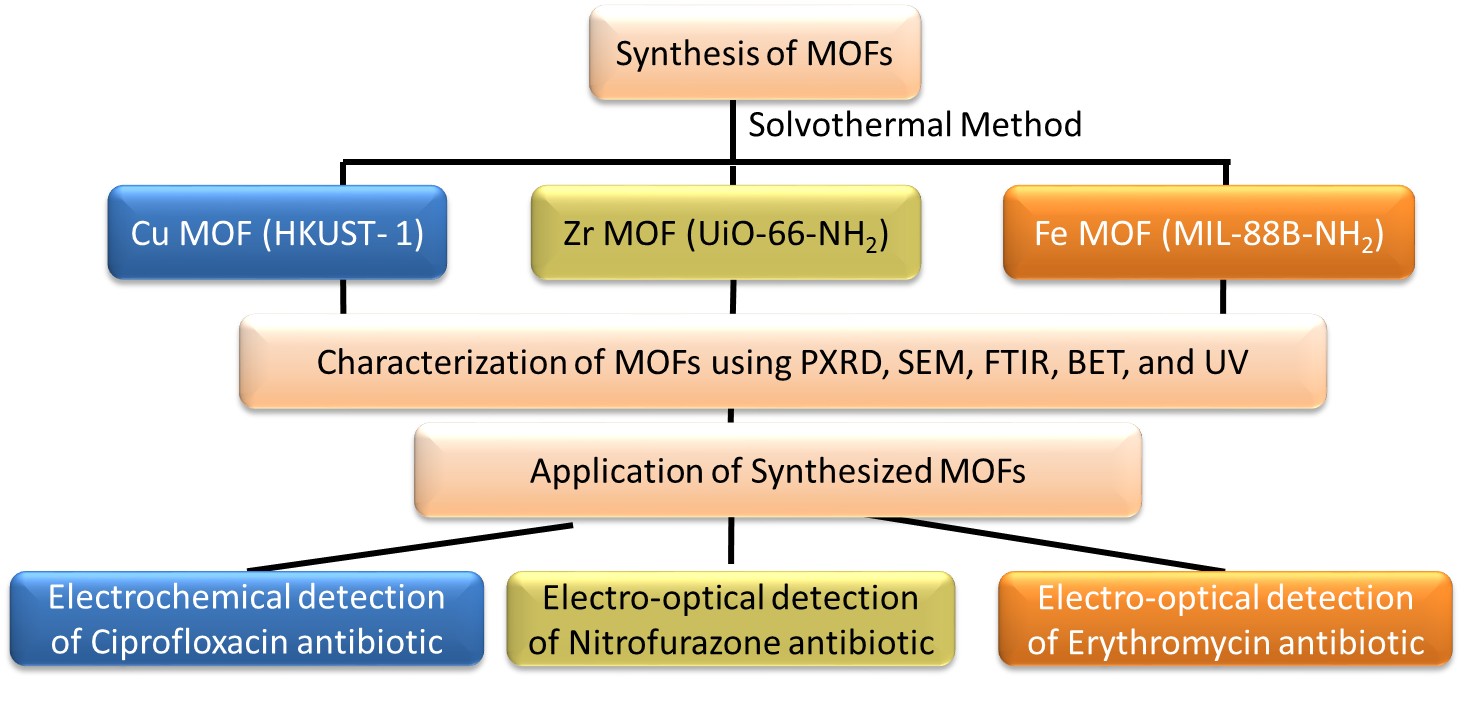
Figure 1 Summary of Ph.D. Research Work
(ⅰ) In the first study, an electrochemical sensor is developed for ciprofloxacin antibiotic which is an emerging water pollutant. For electrochemical sensing, Glassy carbon electrode (GCE) modified with Cu-MOF was used as working electrode (WE). Cu-MOF modified GCE was able to detect ciprofloxacin even at trace levels and gave better performance compared to the other sensors available for ciprofloxacin due to strong interaction between functional groups of copper MOF and CIP antibiotic. The work is published in a reputed SCI-indexed journal.
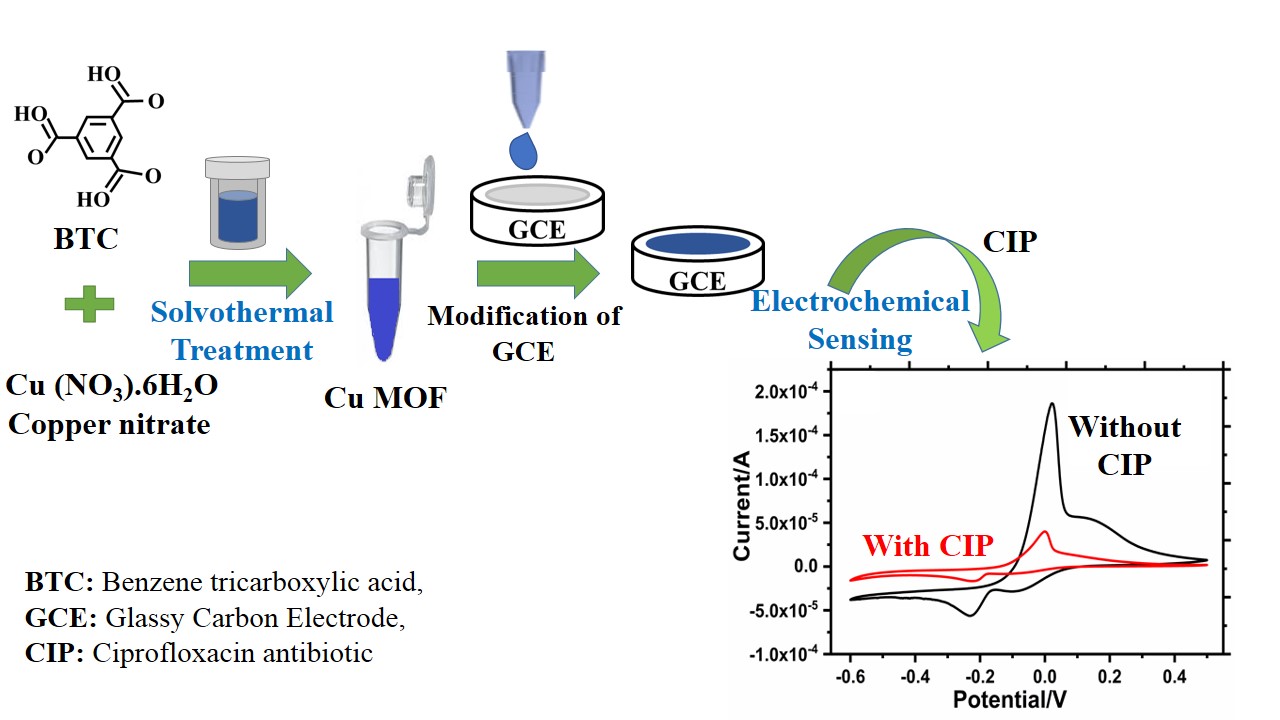
Figure 2 Schematic of Cu-MOF based electrochemical sensing of ciprofloxacin antibiotic
(ⅱ) In the next study, an electrochemical and fluorescent sensor was prepared for another antibiotic i.e. nitrofurazone (NFZ). The sensor was prepared using a zirconium-based MOF (UiO-66-NH2). For electrochemical sensor, screen printed carbon electrode (SPCE) was modified with Zr-MOF and gold nanoparticles. For optical sensing, fluorescence behaviour of Zr-MOF solution was monitored in presence of NFZ. The Zr-MOF based sensor gave better response towards NFZ in terms of detection limit compared to the reported sensors in literature. The work is published in a reputed SCI-indexed journal.
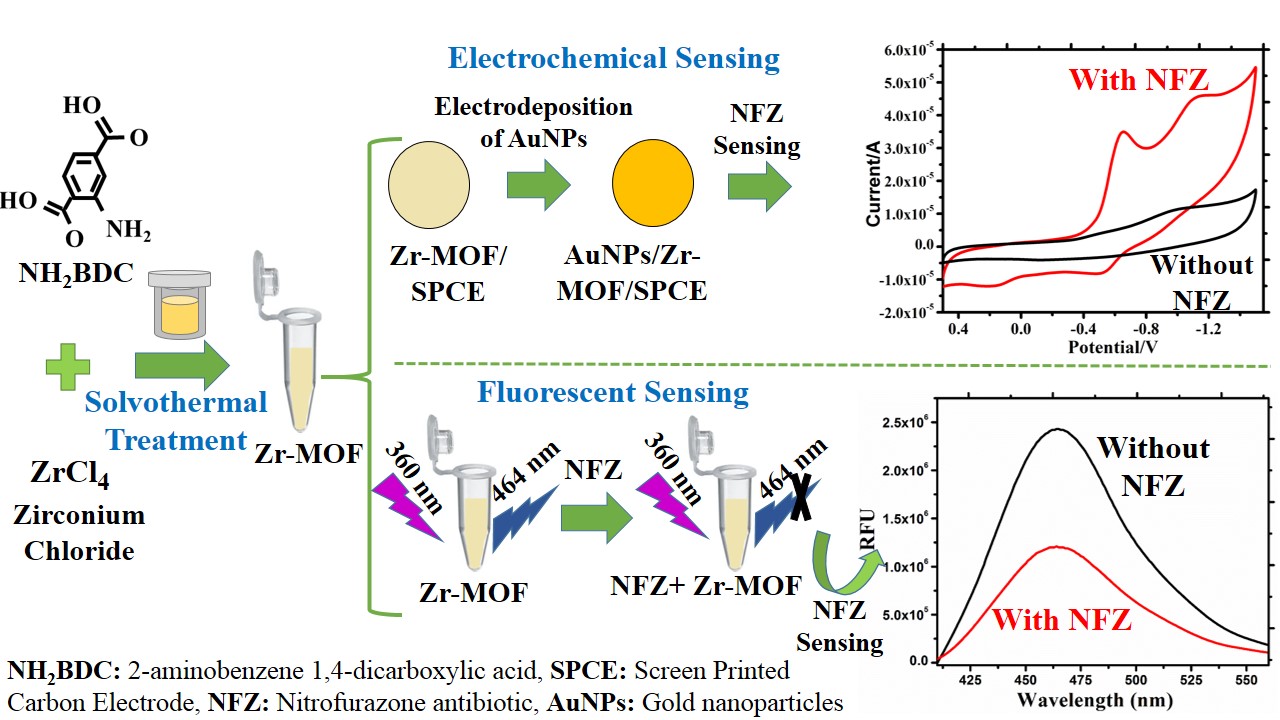
Figure 3 Schematic of Zr-MOF based electrochemical-fluorescent sensing of nitrofurazone antibiotic
(ⅲ) In the third study, a novel dual mode bio-sensor (optical-electrochemical) was developed for another antibiotic i.e. erythromycin (ERY). For this, Fe-MOF was synthesized and then conjugated with ERY specific antibodies (ERYAb) and the conjugate is termed as ERYAb/Fe-MOF, which was used for development of dual mode sensor. For electrochemical sensing, SPCE was modified with ERYAb/ Fe-MOF and for optical sensing, fluorescence behaviour of ERYAb/ Fe-MOF solution was monitored in presence of ERY. This was the first MOF based dual mode sensor for ERY antibiotic. The dual sensor was able to detect ERY antibiotics upto trace levels and the response is better than present ERY sensors.
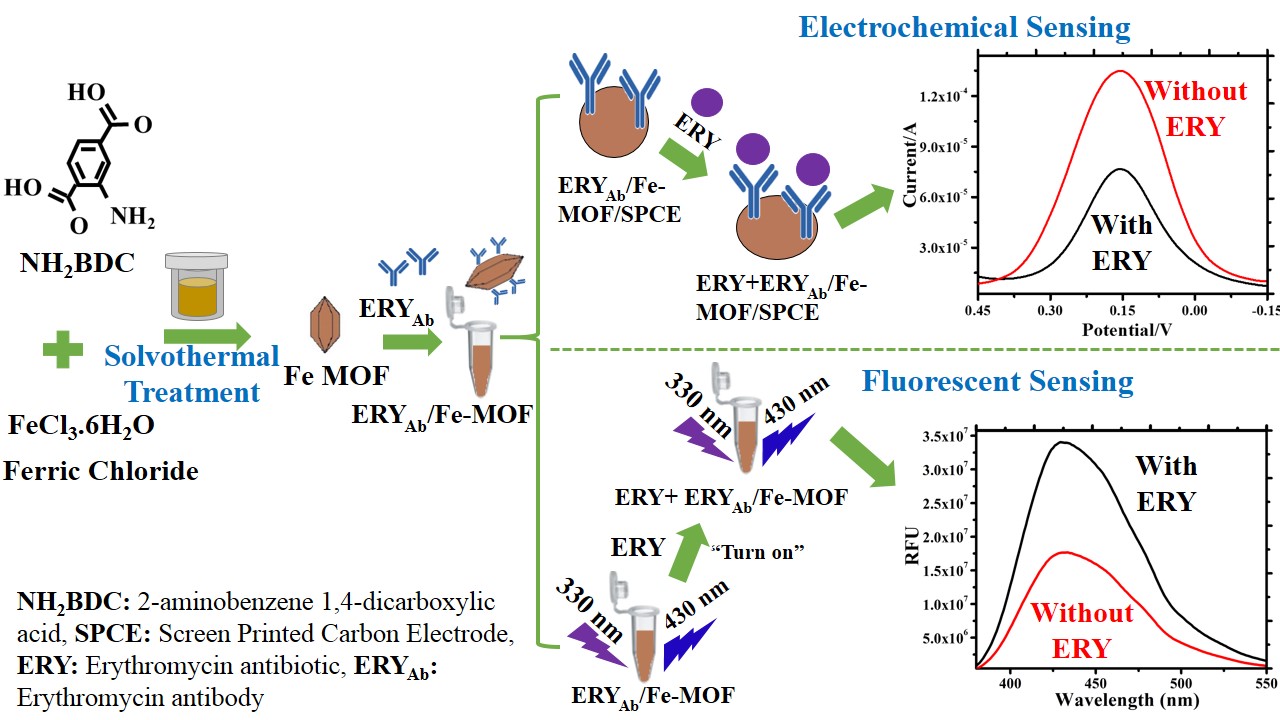
Figure 4 Schematic of Fe-MOF based electrochemical-fluorescent bio-sensing of erythromycin antibiotic
Apart from this, during my Ph.D., I was also involved in the synthesis and characterization of different porous, electro-active, and fluorescent materials viz. activated carbon, gold nanoparticles, 2D materials and their composites with MOFs, etc. and explored their application horizon for environmental pollutant detection and remediation. Some of the research on these materials is also published in SCI-indexed journals and presented in various international conferences. For Ph.D. coursework, I have also completed a project work entitled “Removal of surfactants from laundry wastewater.” In this project, waste organic material-derived activated carbon was used to remove surfactants from laundry wastewater.
Research Activities
Book publication
Poster presentation
Reetu Rani, Kei Toda, Shin Ichi Ohira
Utilizing Zirconium based Metal Organic Framework for Water Remediation Applications
The 18th IROAST Symposium (21st Nov, 2023)

Reetu Rani, Kei Toda, Shin Ichi Ohira
Adsorption studies of alkali and alkaline earth metal ions on zirconium metal–organic frameworks
The 9th Asian Conference on Coordination Chemistry (ACCC9) in Bangkok, Thailand (19th -22nd Feb, 2024) *News
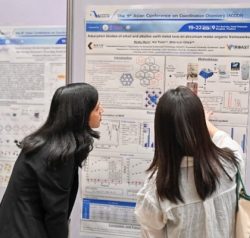
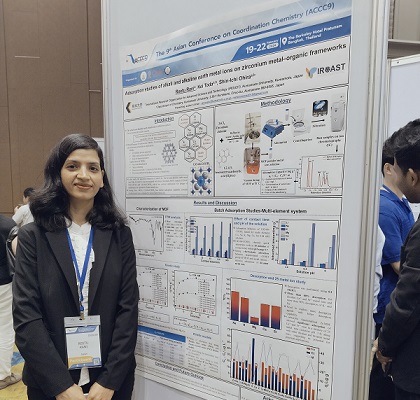
Achievement
Publications
- 2024
- 2023
Grants
Kumamoto University Financial Support for Female Researchers FY2023 (令和5年度熊本大学女性研究者研究力向上のための支援事業),"Sample matrices isolation for ultra-trace metal analysis in sea water by means of metal organic frameworks-based membranes" 2023
- STAFF
-
- Wei XU
- Shinichiro Sawa
- Tetsuya KIDA
- Armando T. QUITAIN
- Junhua WANG
- Yoshihiro SEKINE
- Akira UEDA
- Yusuke INOMATA
- Muhammad Sohail AHMAD
- Jonas Karl N. AGUTAYA
- Nobleson KUNJAPPY
- Prafulla Bahadur MALLA
- Mohammad Atiqur RAHMAN
- Reetu Rani
- Kei TODA
- Tomoyasu MANI
- Agus Pulung SASMITO
- Tung Thanh TRAN
- Dario ZAPPA
- Daniel P. ZITTERBART
- Mitsuhiro AIDA
- U Rajendra ACHARYA
- Dmitri Aleks MOLODOV
- László PUSZTAI
- Yufeng ZHENG
- Gaochuang CAI
- Masahiko FURUTANI
- Hiroki MATSUO
- Zhongyue ZHANG
- Adam Karl SCHWARTZKOPFF
- Takashi ISHIDA
- Takumi HIGAKI
- Takahiro HOSONO
- Kei ISHIDA
- Makiko KOBAYASHI
- Ruda LEE
- Yuta NAKASHIMA
- Shin-Ichi OHIRA
- Atsushi SAINOKI
- Mitsuru SASAKI
- Keitaro TAKAHASHI
- Suttichai ASSABUMRUNGRAT
- Josep-Lluís BARONA-VILAR
- Nicorae BARSAN
- Jorge Norberto BELTRAMINI
- Olivier BOUTIN
- Paul BOWEN
- Pierre BREUL
- Maria Jose COCERO
- Patrice DELMAS
- Martin DIENWIEBEL
- Martino DI SERIO
- Derek ELSWORTH
- Carolina ESCOBAR
- Bruno FAVERY
- Etsuko FUJITA
- Tomonari FURUKAWA
- Jens HARTMANN
- Mohammad Abul HASNAT
- Yang JU
- Hoon KIM
- Ick Chan KWON
- Wen-Shing LEE
- Youn-Woo LEE
- Pavel LEJČEK
- Dongfang LIANG
- Bo LIU
- Tao LIU
- Hui LU
- Reiko ODA
- Yong Il PARK
- Shie-Ming PENG
- Christian RENTENBERGER
- Parasuraman SELVAM
- Amir SI LARBI
- Konstantinos Daniel TSAVDARIDIS
- Gioacchino (Cino) VIGGIANI
- Thomas WAITZ
- Yan XIAO
- Zhenghe XU
- Kazuki TAKASHIMA


